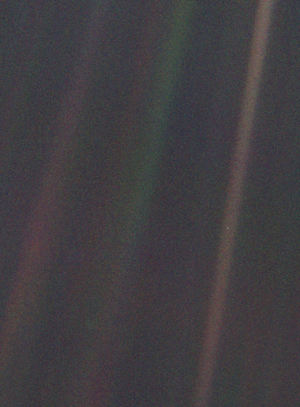Pale Blue Dot (nonfiction): Difference between revisions
Jump to navigation
Jump to search
No edit summary |
No edit summary |
||
| (3 intermediate revisions by the same user not shown) | |||
| Line 11: | Line 11: | ||
== Fiction cross-reference == | == Fiction cross-reference == | ||
* [[Crimes against astronomical constants]] | |||
* [[Gnomon algorithm]] | |||
== Nonfiction cross-reference == | == Nonfiction cross-reference == | ||
| Line 16: | Line 19: | ||
* [[Voyager 1 (nonfiction)]] | * [[Voyager 1 (nonfiction)]] | ||
External links: | == External links == | ||
* [https://en.wikipedia.org/wiki/Pale_Blue_Dot Pale Blue Dot] @ Wikipedia | |||
* [https://www.youtube.com/watch?v=wupToqz1e2g Carl Sagan - Pale Blue Dot] @ YouTube | |||
=== Social media === | |||
[[Category:Nonfiction (nonfiction)]] | [[Category:Nonfiction (nonfiction)]] | ||
[[Category:Earth (nonfiction)]] | |||
[[Category:Outer space (nonfiction)]] | |||
[[Category:Planets (nonfiction)]] | |||
{{Template:Categories: Blue}} | |||
[[Category:Photographs (nonfiction)]] | [[Category:Photographs (nonfiction)]] | ||
Latest revision as of 16:32, 6 November 2024
Pale Blue Dot is a photograph of planet Earth taken on February 14, 1990, by the Voyager 1 space probe from a record distance of about 6 billion kilometers (3.7 billion miles, 40.5 AU), as part of the Family Portrait series of images of the Solar System.
In the photograph, Earth's apparent size is less than a pixel; the planet appears as a tiny dot against the vastness of space, among bands of sunlight scattered by the camera's optics.
Voyager 1, which had completed its primary mission and was leaving the Solar System, was commanded by NASA to turn its camera around and take one last photograph of Earth across a great expanse of space, at the request of astronomer and author Carl Sagan.
In the News
Fiction cross-reference
Nonfiction cross-reference
External links
- Pale Blue Dot @ Wikipedia
- Carl Sagan - Pale Blue Dot @ YouTube
